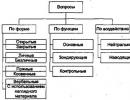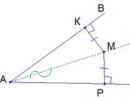The term triple alliance. The Entente and the Triple Alliance - the history of creation, goals, composition. The results of the confrontation between the Entente and the Triple Alliance
Creation of the Triple Alliance
At the end of the nineteenth century, a noticeable rapprochement took place in relations between France and Russia. Austria and Prussia could not help but worry. Moreover, they clearly feared potential retribution from the Russian side for the unfair treatment of its interests during Berlin Congress, so they had to protect themselves somehow. In October 1879, a secret agreement was reached between Germany and Austria, which was indirectly directed against France, and directly against Russia. Three years later, the pact is also signed by Italy. This meant that in 1882 the Triple Alliance was formed. At that time, he became a key factor in European foreign policy. A few years later, there was a high possibility that a Franco-German war would break out. Immediately after that, the text of the agreement was officially published. Thus, Germany and Austria openly declared their sincere desire to preserve peace in Europe and fight against its violators. In fact, German Chancellor Otto von Bismarck wanted to show everyone how powerful militarily his country was at that time.
Russian-French reaction
The Triple Alliance, as mentioned above, posed a serious threat not only to Russia, but also to France. As a result, in 1891, an agreement was also concluded between these two states on mutual assistance in the event of external armed aggression against one of the countries. Having such an agreement, Alexander III was not afraid to openly demonstrate independence in his foreign policy, which in turn led to a change for the worse in relations between Germany and Russia. The creation of the Triple Alliance also marked the beginning of a customs war, which was subsequently settled on terms that were unfavorable to either side. On the part of Germany, duties were increased on Russian products and significantly reduced on Austrian goods. Russia also took action in response.

The situation in Europe
At the time when the Triple Alliance was created under the leadership of Germany, England seized Egypt, which significantly spoiled its relations with Turkey. On the Austrian initiative, Serbia was involved in the union. Russia had very serious difficulties in relations with Bulgaria, since in economic terms it was not able to give her as much as Germany and Austria could. At the same time, as a result of an uprising in Romania, the possibility of its annexation to Bulgaria arose, which was opposed by England and Russia. Bismarck tried to reinsure the Triple Alliance and conclude an agreement with Russia, but Alexander III refused. This further aggravated Russo-German relations and led to many contradictions in terms of the economy.

Entente
In connection with difficult situation in economic relations between Germany and Russia, France in 1893 was the last to open its financial markets. In 1904, in the face of the German threat, England signed an agreement with France, and three years later with Russia, thus completing the formation of the Entente. The creation of this bloc was supposed to prevent Germany from securing European hegemony. Thus, at the beginning of the twentieth century in Europe, the leading states separated, forming two military-political blocs, which became the Entente and the Triple Alliance. Their confrontation was the main reason for the outbreak of the First World War.
The military-political bloc of Germany, Austria-Hungary and Italy, which took shape in 1879-1882 and initiated the division of Europe into warring factions and the preparation of the First World War. Having concluded an alliance with Austria-Hungary in 1879, ... ... Encyclopedia of newsmakers
Triple Alliance- (Triple Alliance) (1882), a secret alliance between Germany, Austria and Italy; concluded in May 1882 on the initiative of Bismarck. The three powers agreed to support each other in the event of an attack by France or Russia. Those. renewed every five ... ... The World History
TRIPLE ALLIANCE- 1882 military-political block of Germany, Austria-Hungary and Italy. In 1904 07, in opposition to the Triple Alliance, a bloc of Great Britain, France and Russia was created (see Entente) ... Big encyclopedic Dictionary
TRIPLE ALLIANCE- 1882, the military-political bloc of Germany, Austria-Hungary and Italy. In 1904 07, in opposition to the Triple Alliance, a bloc of Great Britain, France and Russia was created (see Entente (see Entente)) ... encyclopedic Dictionary
TRIPLE ALLIANCE- a coalition of Germany, Austria-Hungary and Italy, which arose in 1882 and played a major role in unleashing the World War of 1914 Diplomatic Dictionary
Triple Alliance- (Tripelallianz) concluded to maintain peace in Europe between Germany, Austria-Hungary and Italy, after the collapse of the alliance of three emperors, concluded in September 1872 between the German Emperor Wilhelm I, the Austrian Franz Joseph and ... ... Encyclopedic Dictionary F.A. Brockhaus and I.A. Efron
Triple Alliance- (Central Powers) Central Powers, military-political alliance between Germany, Austria-Hungary and Italy, concluded in 1882 ... Countries of the world. Dictionary
Triple Alliance- ... Wikipedia
Triple Alliance- Trinity Union (original) ... Russian spelling dictionary
Triple Alliance 1882- The triple alliance of the military-political bloc of Germany, Austria-Hungary and Italy, which took shape in 1879 1882, which marked the beginning of the division of Europe into hostile camps, played an important role in preparing and unleashing the First World War 1914 1918 ... Wikipedia
Books
- Georgy Ivanov, Irina Odoevtseva, Roman Gul. Triple Alliance. Correspondence 1953-1958, . The material of this book, being introduced into scientific circulation for the first time, is of considerable value to researchers of Russian culture of the 20th century. Correspondence of poets Georgy Ivanov and Irina Odoevtseva with ... Buy for 619 rubles
- The triple alliance Georgy Ivanov - Irina Odoevtseva - Roman Gul, Ariev A. (comp.). The material of this book, being introduced into scientific circulation for the first time, is of considerable value to researchers of Russian culture of the 20th century. Correspondence of poets Georgy Ivanov and Irina Odoevtseva with ... Buy for 393 rubles
- Shamrock. Poems of foreign poets translated by Nikolai Zabolotsky, Mikhail Isakovsky, Konstantin Simonov,. The name of the book was given by the triple union of the names of the translators. The union is forced, but to a certain extent natural. The names of N. Zabolotsky, M. Isakovsky, K. Simonov - famous Soviet poets - in ...
The military-political block of Germany, Austria-Hungary and Italy, which took shape in 1879-1882 and marked the beginning of the division of Europe into warring factions and the preparation of the First World War.
Having concluded an alliance with Austria-Hungary in 1879, Germany, in order to isolate France, energetically looked for a new ally in Italy. Austria-Hungary, wanting to provide its rear in case of war with Russia, was also interested in strengthening cooperation with Italy. As a result of negotiations on May 20, 1882 in Vienna, an alliance treaty was concluded between Germany, Austria-Hungary and Italy.
They pledged (for a period of five years) not to take part in any alliances or agreements directed against any of these countries, to consult on political and economic issues and to provide each other with comprehensive support. Germany and Austria-Hungary pledged to help Italy in the event that she was attacked by France. Italy was to do the same in the event of an unprovoked French attack on Germany. Austria-Hungary was assigned the role of a reserve in case Russia entered the war.
The treaty provided that in an unprovoked attack on one or two parties to the treaty by two or more great powers not participating in the treaty, all three parties to the treaty would go to war with them. In the event of an unprovoked attack on one of the parties to the treaty by one of the great powers not participating in this treaty (except France), the other two parties were obliged to maintain benevolent neutrality in relation to their attacked ally. The agreement provided for a preliminary agreement between the parties on joint actions in the event of a threat to one of them. The parties pledged "in all cases of common participation in the war not to conclude a truce, peace or treaty except with common consent among themselves."
Following the signing of the treaty, Austria-Hungary and Germany, at the insistence of Italy, took note of its special statement, the essence of which was that if England was one of the powers that attacked its partners, then Italy would not provide military assistance provided for by the treaty to its allies. . (Italy was afraid to enter into conflict with England, because she could not resist her strong navy).
On February 20, 1887, the second alliance treaty of the Triple Alliance was signed in Berlin. He confirmed all the provisions of the 1882 treaty and fixed its validity until May 30, 1892. At the same time, separate Italo-Austrian and Italo-German treaties were signed in Berlin, supplementing the obligations of the 1882 treaty.
The Italo-Austrian treaty obliged its participants to try to maintain the territorial status quo in the East.
The Italo-German treaty contained the same obligation to maintain the territorial status quo in the East, but left free rein for both sides in the Egyptian question. It was further stated that if France made an attempt to seize new North African territories, and Italy found it necessary to oppose it, then in the event of war Germany would provide Italy with the same military assistance as was provided for in the alliance treaty of 1882 in the event of a French attack on Italy. In the course of every war undertaken jointly against France, Germany pledged to assist Italy in her efforts to obtain from France "territorial guarantees to secure the borders of the kingdom and its position on the sea." Additional treaties were kept secret and were in force until May 30, 1892.
On May 6, 1891, the Treaty of the Triple Alliance was signed in Berlin for the third time. Its text included all the provisions of the 1882 treaty and the Italo-Austrian and Italo-German treaties of 1887. In addition, Germany and Italy pledged to make efforts to maintain the territorial status quo in Cyrenaica, Tripolitania and Tunisia in North Africa, and if this became impossible, then Germany pledged to support Italy in any action taken "in the interests of balance and obtaining legal compensation ". It was further added: "It goes without saying that in the event of such a case, both powers will also try to enter into an agreement with England." The treaty was concluded for six years, with automatic renewal for the next six years, provided that one or the other party does not denounce it one year before the expiration of the term.
FROM late XIX century Italy, frightened by the growing Anglo-German enmity and suffering the damage from the customs war waged against her by France, began to change the course of her policy. In 1896, she recognized the French protectorate over Tunisia, in 1898 she concluded a trade agreement with France. In 1900, she agreed to the seizure of Morocco by France in exchange for the recognition of Italian "rights" to Tripoli. In 1902, she concluded an agreement with France, pledging to remain neutral in the event of a Franco-German war caused by Germany. But formally, Italy remained a member of the Triple Alliance and participated in its new renewal in 1902, secretly informing France about this.
On June 28, 1902, the fourth treaty of alliance between Austria-Hungary, Germany and Italy was signed in Berlin and concluded for a six-year period with the terms of the extension stipulated in the previous agreement. In a secret declaration communicated to the Italian government on June 30, the Austro-Hungarian government announced that it was striving to maintain the territorial status quo in the East, but would not do anything that could interfere with Italian actions dictated by its interests in Tripolitania and Cyrenaica.
On December 5, 1912, the fifth treaty of the Triple Alliance was signed in Vienna. Its content was identical to the treaties of 1891 and 1902.
In 1915, with the entry of Italy into the First world war(1914-1918) on the side of the Entente, the Triple Alliance broke up.
The military-political bloc of Germany, Austria-Hungary and Italy, which took shape in 1879-1882 and initiated the division of Europe into warring factions and the preparation of the First World War. Having concluded an alliance with Austria-Hungary in 1879, ... ... Encyclopedia of newsmakers
Triple Alliance- (Triple Alliance) (1882), a secret alliance between Germany, Austria and Italy; concluded in May 1882 on the initiative of Bismarck. The three powers agreed to support each other in the event of an attack by France or Russia. Those. renewed every five ... ... The World History
1882 military-political bloc of Germany, Austria-Hungary and Italy. In 1904 07, in opposition to the Triple Alliance, a bloc of Great Britain, France and Russia was created (see Entente) ... Big Encyclopedic Dictionary
1882, military-political bloc of Germany, Austria-Hungary and Italy. In 1904 07, in opposition to the Triple Alliance, a bloc of Great Britain, France and Russia was created (see Entente (see Entente)) ... encyclopedic Dictionary
The coalition of Germany, Austria-Hungary and Italy, which arose in 1882 and played a major role in unleashing the World War of 1914 Diplomatic Dictionary
- (Tripelallianz) concluded to maintain peace in Europe between Germany, Austria-Hungary and Italy, after the collapse of the alliance of three emperors, concluded in September 1872 between the German Emperor Wilhelm I, the Austrian Franz Joseph and ... ... Encyclopedic Dictionary F.A. Brockhaus and I.A. Efron
Triple Alliance- (Central Powers) Central Powers, military-political alliance between Germany, Austria-Hungary and Italy, concluded in 1882 ... Countries of the world. Dictionary
- ... Wikipedia
Triple Alliance- Trinity Union (original) ... Russian spelling dictionary
The triple alliance of the military-political bloc of Germany, Austria-Hungary and Italy, which took shape in 1879 1882, which marked the beginning of the division of Europe into hostile camps, played an important role in preparing and unleashing the First World War 1914 1918 ... Wikipedia
Books
- Georgy Ivanov, Irina Odoevtseva, Roman Gul. Triple Alliance. Correspondence 1953-1958, . The material of this book, being introduced into scientific circulation for the first time, is of considerable value to researchers of Russian culture of the 20th century. Correspondence of poets Georgy Ivanov and Irina Odoevtseva with ...
- The triple alliance Georgy Ivanov - Irina Odoevtseva - Roman Gul, Ariev A. (comp.). The material of this book, being introduced into scientific circulation for the first time, is of considerable value to researchers of Russian culture of the 20th century. Correspondence of poets Georgy Ivanov and Irina Odoevtseva with ...
- Shamrock. Poems of foreign poets translated by Nikolai Zabolotsky, Mikhail Isakovsky, Konstantin Simonov,. The name of the book was given by the triple union of the names of the translators. The union is forced, but to a certain extent natural. The names of N. Zabolotsky, M. Isakovsky, K. Simonov - famous Soviet poets - in ...
For the Triple Alliance of 1668, see: Triple Alliance
Triple Alliance- the military-political bloc of Germany, Austria-Hungary and Italy, formed in 1879-1882, which marked the beginning of the division of Europe into hostile camps and played an important role in the preparation and unleashing of the First World War (1914-1918).
The main organizer of the Triple Alliance was Germany, which concluded a military alliance with Austria-Hungary in 1879 (see: Austro-German Treaty). After that, in 1882, Italy joined them. The core of an aggressive military group in Europe directed against Russia and France was created.
On May 20, 1882, Germany, Austria-Hungary and Italy signed a secret Treaty of the Triple Alliance. They undertook obligations (for a period of 5 years) not to take part in any alliances or agreements directed against one of these countries, to consult on political and economic issues and to provide mutual support. Germany and Austria-Hungary pledged to provide assistance to Italy in the event that she "would be attacked by France without a direct challenge from her side." Italy was to do the same in the event of an unprovoked French attack on Germany. Austria-Hungary was assigned the role of a reserve in case Russia entered the war. The Allies took note of Italy's statement that if one of the powers that attacked its partners was Great Britain, then Italy would not provide military assistance to them (Italy was afraid to enter into conflict with Great Britain, as she could not resist her strong navy). In the event of joint participation in the war, the parties pledged not to conclude a separate peace and to keep the Treaty on the Triple Alliance secret.
The treaty was renewed in 1887 and 1891 (at the same time additions and clarifications were made) and automatically extended in 1902 and 1912.
The policy of the countries participating in the Triple Alliance was characterized by increasing aggressiveness (see: Moroccan crises, Italo-Turkish war). In response to the creation of the Triple Alliance in 1891-1893, a Franco-Russian alliance took shape, in 1904 an Anglo-French agreement was concluded, in 1907 an Anglo-Russian agreement, the Entente was formed.
From the end of the 19th century, Italy, which suffered losses from the customs war waged against it by France, began to change its political course. In 1902, she concluded an agreement with France, pledging to remain neutral in the event of a German attack on France. After the conclusion of the London Pact, Italy entered the First World War on the side of the Entente, and the Triple Alliance broke up (1915). After Italy left the union, Bulgaria and Ottoman Empire joined Germany and Austria-Hungary, forming a quadruple alliance.






